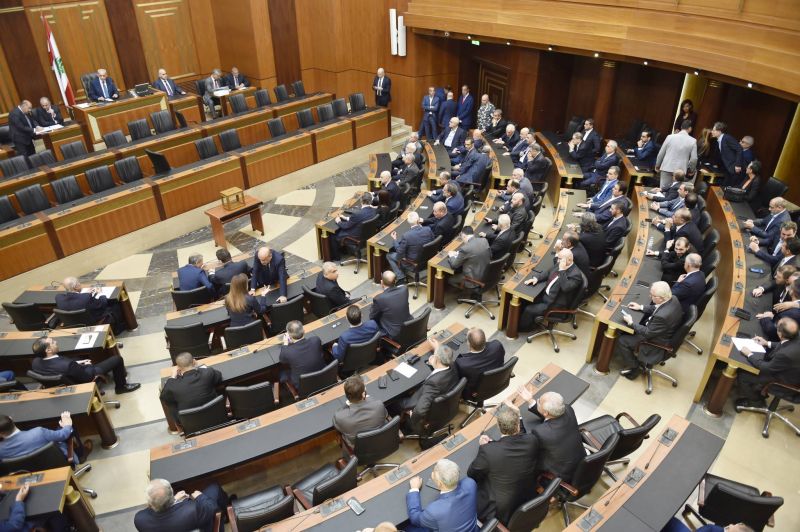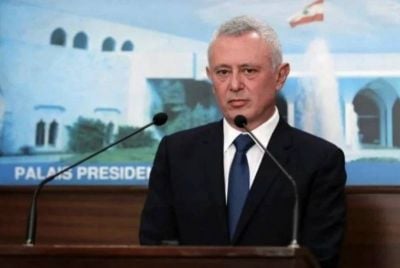
The Lebanese Parliament on Oct. 24, 2022. (Credit: Hassan Ibrahim/Lebanese Parliament)
Lebanese MPs failed on Thursday — at the end of a sixth dedicated parliamentary session — to elect a successor to former President Michel Aoun, whose term expired on Oct. 31.
This new failure came after several MPs, including from the Free Patriotic Movement and Hezbollah, withdrew from the session after a first round of voting, resulting in the loss of a quorum.
In the meantime, the country remains confronted, for the first time in its history, with a double power vacuum in the executive: it is without a head of state and Mikati's cabinet continues to hold only caretaker authority since its assumption of the status following parliamentary elections in May.
According to Speaker of Parliament Nabih Berri, the quorum of 86 out of 128 MPs, necessary for the session to take place was met at the opening of the session but was lost before a second round of voting could take place.
The session opened with a half-hour debate on the Constitution and the question of the quorum needed for the second round of voting. Kataeb MP Sami Gemayel addressed Nabih Berri, saying, "It is our right to ask you which article you rely on to state that a quorum of 86 MPs is necessary for each round." This was followed by an exchange of invective between Nadim Gemayel (Kataeb/Beirut I) and Qabalan Qabalan (Amal/West Bekaa-Rashaya). Other MPs then called for a dialogue around the Constitution and its articles. Berri finally stated, "This is not a dialogue session! … We told you from the first day: we must find a consensus," before the MPs were called to vote.
One vote cast for Sleiman Frangieh
A total of 112 MPs voted in the first round. 43 voted for Zgharta MP Michel Moawad who had received 44 votes in the fifth election session; 7 voted for professor and academic Issam Khalifeh who received six votes last week, and 46 voted blank.
For the first time, a vote was cast for Sleiman Frangieh, head of the Marada Movement.
Three votes were also given to former Interior Minister Ziad Baroud, nine for "New Lebanon," one for MP Michel Daher (a Greek-Catholic) and two ballots were canceled.
After the loss of the necessary quorum, Berry announced that a new session would be held on Nov. 24.
'Arrangements to the detriment of the Lebanese'
At the end of the session, Marc Daou, Forces of Change MP, said that "Michel Moawad is now the best choice," even if he did not vote for him during this session. "We tried an initiative and circulated names, such as Issam Khalifeh or Ziyad Baroud, but it did not lead to anything," Daou told local media outlets. "We have to vote for someone who can win," he added, without saying whether he would vote for Moawad in the future.
For his part, Moawad stressed that an "agreement in principle" had been reached with Daou and Najat Aoun Saliba, who belong to the same party, but added that this agreement had "not been translated in this session, because there must first be a political consensus."
"The situation is clear: there are those who want a purely Lebanese election and those who expect interference from outside," Moawad said, referring to the camp of Hezbollah and its allies. "These interferences will lead to arrangements to the detriment of the Lebanese," he added.
Meanwhile, Lebanese Forces MP Ghassan Hasbani again called for "an explanation session of the constitution," as his colleague Georges Adwan had done during the session. Amal MP Ali Hassan Khalil recalled that Frangieh, who obtained one vote in today's session, "has not officially announced his candidacy," adding that while Frangieh "is one of the names around which we can discuss," the Marada Movement leader's candidacy is not, as yet, formally backed by the LF.
In each of the electoral sessions held thus far, Parliament has not reached a second round of voting because members of Hezbollah and its allies have withdrawn from the session after the first round, leading to a loss of the required quorum to continue the session. Berri considers that each new session resets the voting process, meaning that even if a first round vote took place at the previous session, the legislature will again begin with a first round vote. There is some debate that this approach contradicts the constitution, according to which, a two-thirds majority is needed to elect a president in the first round of voting, while only a simple majority is required in all subsequent rounds. Some contend that first found should be considered as the vote Parliament held on Sept. 29, which returned no conclusive results.
